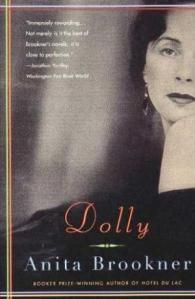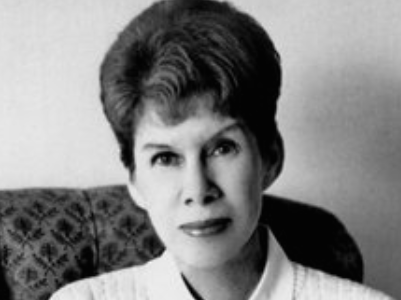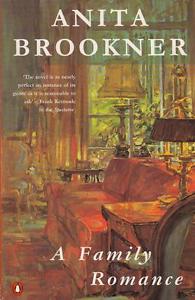Anita Brookner’s death last week at the age of 87 has prompted a “Brookner-thon” at my house. I can read one of her short elegant books in a day, and this week I have raced through Dolly and A Closed Eye.
Brookner is a stunning writer, reminiscent of Henry James. I am astonished by the crystalline quality of her prose. She wrote 24 novels, and I took her for granted: I had been looking for the new Brookner. I never thought of her getting older. I only thought of my need to read her exquisite, perfectly shaped sentences.
When I read her books as a young woman, I was enthralled by her accounts of independent women. Now I love the books, but also find them painful. Her heroines are usually single, emotionally remote, and shut out of everyday relationships. They spend their time reading David Copperfield and wandering through art museums in London. (Brookner was also an art historian.) Perhaps I understand these heroines better now that I am older, and even better because I have finally visited London. I have seen the paintings that fascinate her heroines. I know some of the neighborhoods.
 Dolly, published in 1993, is a small masterpiece, much more complex than her early work. It explores the relationship between Jane, a young woman, and her Aunt Dolly, who turns out to be a hustler. The narrator, Jane Manning, a very quiet writer of children’s books, grew up in a peaceful household in London: her well-to-do parents, Paul and Henrietta, read for recreation and certainly did not go in for luxury. Hence Jane is fascinated when her exuberant, well-dressed Aunt Dolly, who lives for bridge, dancing, and social engagements, breezes in from Brussels with Uncle Hugo, a former mama’s boy now very much under Dolly’s thumb. Dolly isn’t very nice to the Mannings: essentially she stole Hugo from his mother and considers his sister, Henrietta, a nonentity. Henrietta anxiously tries to please the couple by taking them to dinner at the Ritz, but Dolly is accustomed to the best restaurants and bored. Dolly and Hugo go out in the evenings to play bridge: Dolly is frantic when she learns that Henrietta and Paul do not play. Henrietta explains they prefer to read.
Dolly, published in 1993, is a small masterpiece, much more complex than her early work. It explores the relationship between Jane, a young woman, and her Aunt Dolly, who turns out to be a hustler. The narrator, Jane Manning, a very quiet writer of children’s books, grew up in a peaceful household in London: her well-to-do parents, Paul and Henrietta, read for recreation and certainly did not go in for luxury. Hence Jane is fascinated when her exuberant, well-dressed Aunt Dolly, who lives for bridge, dancing, and social engagements, breezes in from Brussels with Uncle Hugo, a former mama’s boy now very much under Dolly’s thumb. Dolly isn’t very nice to the Mannings: essentially she stole Hugo from his mother and considers his sister, Henrietta, a nonentity. Henrietta anxiously tries to please the couple by taking them to dinner at the Ritz, but Dolly is accustomed to the best restaurants and bored. Dolly and Hugo go out in the evenings to play bridge: Dolly is frantic when she learns that Henrietta and Paul do not play. Henrietta explains they prefer to read.
“Oh, read,” said Dolly. “Well, of course, I am a great reader myself, but in our circle one has to mix, otherwise one would know no one.”
“I suppose you have a great many friends,” said my mother.
“Yes, I can certainly say that we are well liked. Not that we mix too much with the expatriate community, except for bridge, of course. Our dear friend Adele Rougier is the one we see most constantly. Her husband was our ambassador to Zaire, you know….”
I find this dialogue both comical and heartbreaking. Dolly is so snobbish, yet she reads romances and is oblivious of the Mannings’ different values. I find Henrietta’s supposition that Dolly has friends poignants. Jane, who sees all this, regards Dolly as a monster, and Dolly dismisses her because she is quiet, intelligent, and dully dressed. But after Hugo’s death, Dolly, who was raised in France by her mother, a Jewish dressmaker who sewed for the neighborhood prostitutes and was saved during the Occupation by these women’s relationships with Nazis, now is unwilling to be deprived of luxury. She decides her best bet is to live with Hugo’s rich mother, who sends her packing with a small allowance. Dolly is an opportunist: she borrows money often from Henrietta. But after Henrietta’s death, Jane begins to understand Dolly better.
I love Jane, but she breaks my heart. She is content with her routine, her job at a cuttings agency, her walks, and her books. After her parents die, her only real friend is John Pickering, her parents’ solicitor. After the cuttings agency closes, she writes her first children’s book and studies fairy tales. When she speaks on “Sleeping Beauty” at small American women’s colleges, she prefers the middle-aged women in their fifties to her feminist peers. Although the feminists worry about sexual harassment and study gender in 1950s melodrama, they turn out to be “reconstructed” when they learn Jane doesn’t have a husband. They regard her lack of a relationship with a man as a failure, much as Dolly does.
Jane writes,
It is not that they would necessarily want me to find love and marriage, in the sense of a happy ending. But if I were sharing household chores with some cheerful fellow in jeans and a shirt ironed by himself they could understand me better. How then to disappoint them by telling them that I prefer the fairy-tale version, and will prefer it till I die, even though I may be destined to die alone?
Brookner is so quietly barbed it almost went past me. “Some cheerful fellow in jeans and a shirt ironed by himself”: didn’t we all marry him? I know that Jane’s solitude is not as hard for Jane as it would be for some of us, but it is not easy, either. Surely women who live alone find it easier if they have friends. But Dolly has friends who are not real friends: she is lonely. And Jane’s coming to terms with Dolly is perhaps the loveliest thing in this graceful, pitch-perfect novel.



Great post Kat. Loneliness does seems to be at the heart of Brookner’s books and it’s a dichotomy so many women face. Do you retain that independence and risk ending up old and isolated, or do your compromise and end up married to someone in a life you don’t really want. I don’t think the choices have got any easier for women!
LikeLike
Her heroines are so alone! Oddly, her first book has moments of comedy. There is wit here, but really it is a very serious book. The heroines know they’re supposed to be living a different way in the late 20th century, but they can’t manage.
LikeLiked by 1 person
I’ve love Brookner’s novels when they first started coming out. (Did I mention her in a comment to one of your previous blogs). I not only identified and found myself in heroines like Jane (metaphorically, not the specifics but the situation), I loved her for telling these truths. I too have often found the non-feminist woman much easier to relate to, and offering more mutual intelligent respect than younger career feminists. I’ve never thought about how they might judge others based on their marriage or having children. Since I was married, I never felt the judgemental calls on that, only on the career I didn’t have.
Thank you for this posting. You present so many books I want to read, almost immediately.
I shall look out for some good essays on her. I fear there would not be many (or hardly at all). She did not get prizes; she breaks all sorts of taboos. Her woman’s books are not disguised or leavened to look like something more prestigious the way say Penelope Fitzgerald intuitively managed with her use of irony.
LikeLike
Brookner criticizes society through these women who don’t fit in. They are lonely, but get by. I guess “relationships” are the test Jane doesn’t pass; she seems abnormal to her feminist friends, who have husbands and children in addition to their work. Weirdly, I thought for a minute of The Bostonians. Brookner is like James, but her women don’t suffer the same fates.
Oh, by the way, there is a good essay on Brookner at The Guardian by Julian Barnes.
LikeLike